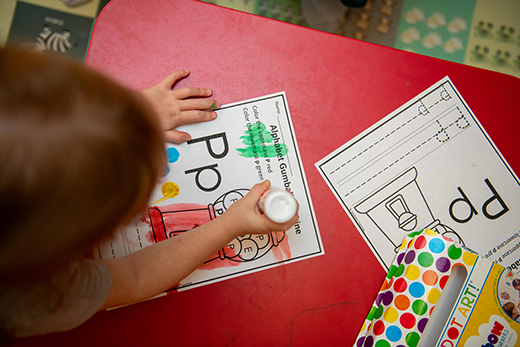K-State leads statewide project to rebuild early child care workforce
Monday, Aug. 7, 2023

Kansas State University researchers are collaborating on a grant to rebuild the state's early childhood education workforce. The multiphase, multiyear plan coordinates with partnering agencies, organizations, associations, and secondary and post-secondary institutions to implement competency-based career pathways. | Download this photo.
MANHATTAN — At a time when the number of early childhood care and education professionals does not meet demand, Kansas State University researchers and professional staff are working to rebuild the state's workforce.
The Kansas Department for Children and Families has awarded more than $5 million in initial funding for a collaborative project involving K-State. The project will implement a multi-level career pathway, which serves as a tool and aspirational plan to guide current and interested members of the early childhood workforce to advancement opportunities.
The career pathway is a primary component of the workforce development goal of the state's All In For Kansas Kids strategic plan. The plan was developed with funding through the Preschool Development Grant to Kansas to the Kansas Children's Cabinet and Trust Fund.
Bronwyn Fees, K-State professor of applied human sciences, serves as the principal investigator for Kansas Child Care Training Opportunities, or KCCTO, which is the organization that received the funding. KCCTO is a K-State-sponsored project that provides professional development and technical assistance to early childhood professionals across Kansas.
The multiphase, multiyear plan coordinates with partnering agencies, organizations, associations, and secondary and post-secondary institutions to implement the competency-based career pathway. The project's first phase included assembling a steering committee representing a breadth and depth of expertise in early childhood care and education systems to develop an implementation plan for the career pathway. K-State's Office of Educational Innovation and Evaluation will evaluate the full implementation.
"The early childhood career pathways initiative ensures the state expands the workforce needed to provide quality child care and education," said Fees, who also serves as associate dean for academic and faculty affairs in K-State's College of Health and Human Sciences. She is also a member of the state's Early Childhood Recommendations Panel.
The project's second phase is underway and includes gathering industry and partner feedback, launching an awareness campaign, conducting a comprehensive workforce survey, developing a coaching/mentoring system, and engaging our secondary and post-secondary institutions in partnership with the non-credit-bearing professional development partners across the state.
"It is essential to support well-trained professionals in early care and education for children and their families to thrive," said Fees. "Our state's economy relies on parents who are confident their children are experiencing the best possible care and education while they are at work or school."
The lack of available child care spaces is a national issue that is affecting Kansas families, businesses and local economies. According to Child Care Aware of Kansas, Kansas has lost 1,952 child care openings since 2021. Additionally, available openings only meet demand 42% of the time. One of the primary barriers to filling these openings, however, is the lack of educators.
"By working together with professional organizations and all higher education institutions in the state, individuals entering or already in the early childhood care and education workforce can easily identify how they are progressing," said Fees. "The coordinated training systems ensures a quality, well-trained workforce to meet demand."
According to Fees, Kansas is developing an early childhood care and education registry system. The career pathway implementation plan will be coordinated with the development of a registry. Once live, it will allow early childhood care and education professionals to track the professional development courses, college credits earned and identify where they are and opportunities to advance on the career pathway.
Patty Peschel, director of Kansas Child Care Training Opportunities, says this program has the potential for significant, positive effects on individuals in early child care careers and the children and families they support.
"Whether an individual is new to the workforce, has several years of experience or is degree-seeking, the intent of the career pathway is to respect and acknowledge experience and education while ensuring access to advancement and success," said Peschel.
This grant project aligns with the K-State 105 initiative, the university's answer to the call for a comprehensive economic growth and advancement solution for Kansas. The initiative leverages the statewide K-State Research and Extension network to deliver the full breadth of the university's collective knowledge and solution-driven innovation to every Kansan where they live and work. K-State 105 also forges the connections and partnerships that create access to additional expertise within other state institutions and agencies, nonprofits and corporations — all part of an effort to build additional capacities and strengths in each of Kansas' 105 counties.
